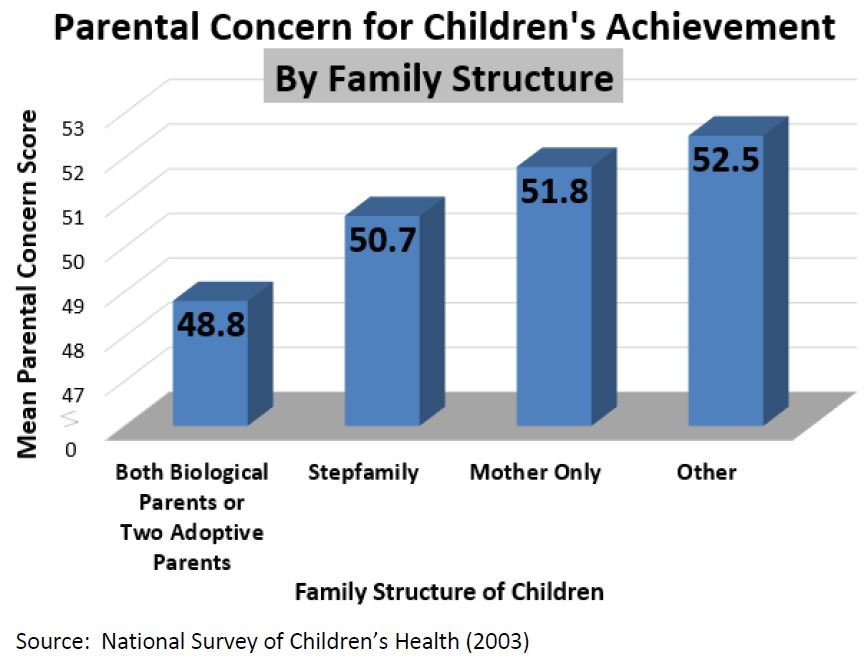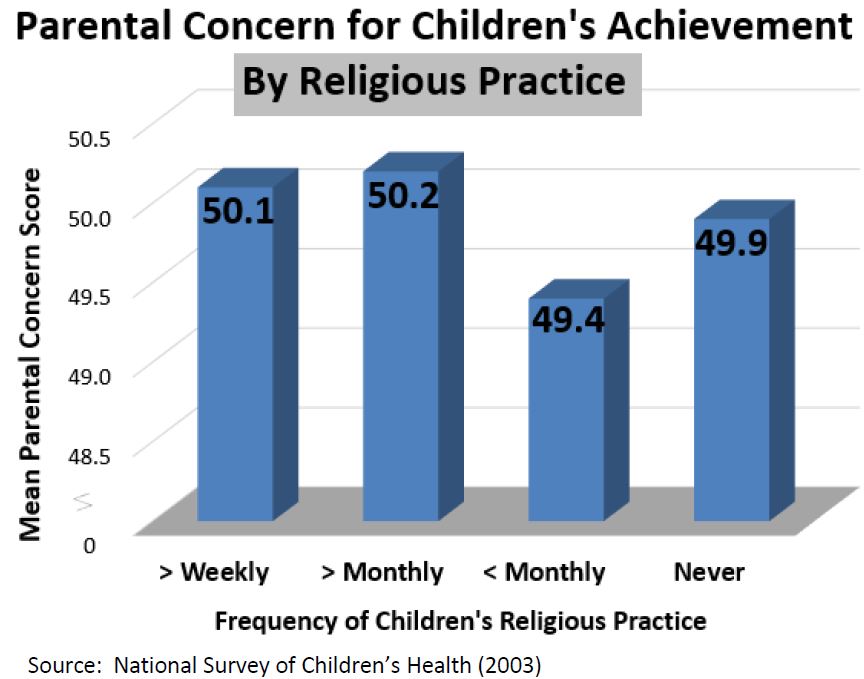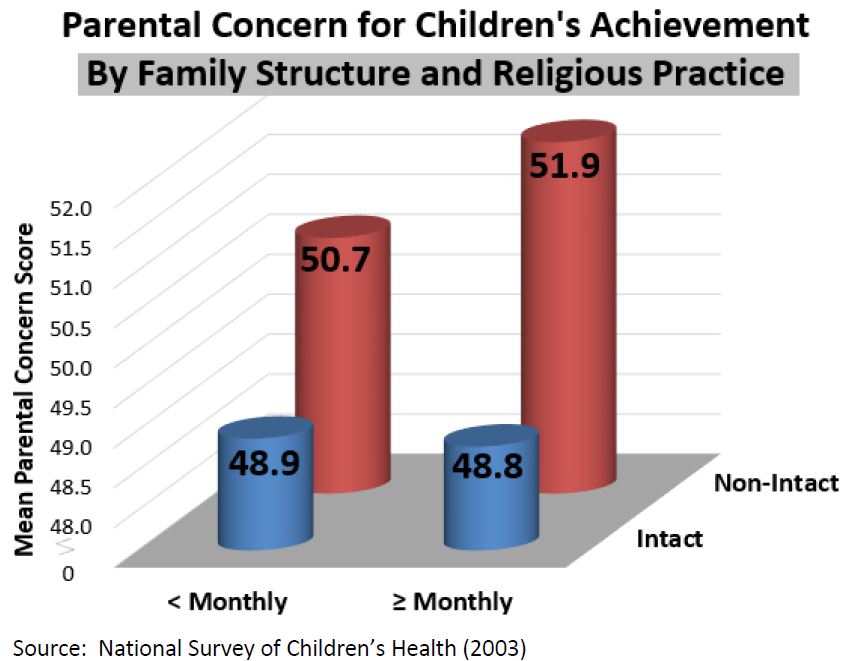Click Here to download “Parental Concern for Children’s Achievement by Family Structure and Religious Practice”
Parental Concern for Children’s Achievement by Family Structure and Religious Practice
Family Structure: According to the National Survey of Children’s Health,
[1] children who lived with both biological parents or two adoptive parents had parents who scored lowest on the parental concerns scale (48.8); children who lived with a biological parent or stepparent had parents with a parental concerns score of 50.7;
[2] children who lived with single mothers had parents with a parental concerns score of 51.8; and, children who lived within other family configurations, such as with their father only or with foster parents, had parents with the highest parental concerns score (52.5).
[3]
 Religious Practice:
Religious Practice: According to the National Survey of Children’s Health,
children who attended religious services less than once a month had parents with the lowest parental concerns score (49.4); children who never attended religious services had parents with a parental concerns score of 49.9; children who attended religious services at least weekly had parents with a parental concerns score of 50.1; and children who worshipped one to three times a month had parents with the highest parental concerns score (50.2).
 Family Structure and Religious Practice Combined:
Family Structure and Religious Practice Combined: According to the National Survey of Children’s Health, children who lived with both biological parents or with two adoptive parents and worshipped at least monthly had parents who scored lowest on the parental concerns scale (48.8). Children who lived with both biological parents or with two adoptive parents and worshipped less than monthly had parents with a parental concerns score of 48.9. Children who lived in single-parent or reconstituted families and worshipped less than monthly had parents with a parental concerns score of 50.7. Children who lived in single-parent or reconstituted families and worshipped at least monthly had the highest parental concerns score (51.9).
 Related Insights from Other Studies:
Related Insights from Other Studies: Several other studies in related areas add insights. William Jeynes of the California State University at Long Beach reported that black and Hispanic students “who were devoutly religious and also came from intact families” outperformed academically black and Hispanic students who did not fall into both of these categories.
Jay Teachman of Washington State University and colleagues found that children living with divorced fathers are less likely to see their fathers “involved with their schools” than children living with both biological parents. They also reported that families who “send their children to Catholic schools are also families that connect quite closely with their children’s schools.”
Several previous issues of Mapping America
[4] demonstrated that children who attend religious services once a month or more and live in intact families are less likely to repeat a grade and less likely to be the object of a “behavior problems” call from their school to their parents than those who worship less than monthly and live in non-intact families.
As the data indicate, children who live with both biological parents and are involved in religious programs tend to have a higher degree of academic achievement while also having parents who are more involved in their education.
[1] These charts draw on data collected by the National Center for Health Statistics in the National Survey of Children’s Health (NSCH) in 2003. The data sample consisted of parents of 102,353 children and teens in all 50 states and the District of Columbia. 68,996 of these children and teens were between six and 17 years old, the age group that was the focus of the study. The survey sample in this age range represented a population of nearly 49 million young people nationwide.
[2] Most of the parents in the “biological parent and a stepparent” category are married.
[3] “Other family configurations” also include children living with grandparent or other relatives.
[4] See “Children Repeated a Grade in School” and “Parents Contacted By School About Child’s Behavior Problems”]]>
 Religious Practice: According to the National Survey of Children’s Health, children who attended religious services less than once a month had parents with the lowest parental concerns score (49.4); children who never attended religious services had parents with a parental concerns score of 49.9; children who attended religious services at least weekly had parents with a parental concerns score of 50.1; and children who worshipped one to three times a month had parents with the highest parental concerns score (50.2).
Religious Practice: According to the National Survey of Children’s Health, children who attended religious services less than once a month had parents with the lowest parental concerns score (49.4); children who never attended religious services had parents with a parental concerns score of 49.9; children who attended religious services at least weekly had parents with a parental concerns score of 50.1; and children who worshipped one to three times a month had parents with the highest parental concerns score (50.2).
 Family Structure and Religious Practice Combined: According to the National Survey of Children’s Health, children who lived with both biological parents or with two adoptive parents and worshipped at least monthly had parents who scored lowest on the parental concerns scale (48.8). Children who lived with both biological parents or with two adoptive parents and worshipped less than monthly had parents with a parental concerns score of 48.9. Children who lived in single-parent or reconstituted families and worshipped less than monthly had parents with a parental concerns score of 50.7. Children who lived in single-parent or reconstituted families and worshipped at least monthly had the highest parental concerns score (51.9).
Family Structure and Religious Practice Combined: According to the National Survey of Children’s Health, children who lived with both biological parents or with two adoptive parents and worshipped at least monthly had parents who scored lowest on the parental concerns scale (48.8). Children who lived with both biological parents or with two adoptive parents and worshipped less than monthly had parents with a parental concerns score of 48.9. Children who lived in single-parent or reconstituted families and worshipped less than monthly had parents with a parental concerns score of 50.7. Children who lived in single-parent or reconstituted families and worshipped at least monthly had the highest parental concerns score (51.9).
 Related Insights from Other Studies: Several other studies in related areas add insights. William Jeynes of the California State University at Long Beach reported that black and Hispanic students “who were devoutly religious and also came from intact families” outperformed academically black and Hispanic students who did not fall into both of these categories.
Jay Teachman of Washington State University and colleagues found that children living with divorced fathers are less likely to see their fathers “involved with their schools” than children living with both biological parents. They also reported that families who “send their children to Catholic schools are also families that connect quite closely with their children’s schools.”
Several previous issues of Mapping America[4] demonstrated that children who attend religious services once a month or more and live in intact families are less likely to repeat a grade and less likely to be the object of a “behavior problems” call from their school to their parents than those who worship less than monthly and live in non-intact families.
As the data indicate, children who live with both biological parents and are involved in religious programs tend to have a higher degree of academic achievement while also having parents who are more involved in their education.
[1] These charts draw on data collected by the National Center for Health Statistics in the National Survey of Children’s Health (NSCH) in 2003. The data sample consisted of parents of 102,353 children and teens in all 50 states and the District of Columbia. 68,996 of these children and teens were between six and 17 years old, the age group that was the focus of the study. The survey sample in this age range represented a population of nearly 49 million young people nationwide.
[2] Most of the parents in the “biological parent and a stepparent” category are married.
[3] “Other family configurations” also include children living with grandparent or other relatives.
[4] See “Children Repeated a Grade in School” and “Parents Contacted By School About Child’s Behavior Problems”]]>
Related Insights from Other Studies: Several other studies in related areas add insights. William Jeynes of the California State University at Long Beach reported that black and Hispanic students “who were devoutly religious and also came from intact families” outperformed academically black and Hispanic students who did not fall into both of these categories.
Jay Teachman of Washington State University and colleagues found that children living with divorced fathers are less likely to see their fathers “involved with their schools” than children living with both biological parents. They also reported that families who “send their children to Catholic schools are also families that connect quite closely with their children’s schools.”
Several previous issues of Mapping America[4] demonstrated that children who attend religious services once a month or more and live in intact families are less likely to repeat a grade and less likely to be the object of a “behavior problems” call from their school to their parents than those who worship less than monthly and live in non-intact families.
As the data indicate, children who live with both biological parents and are involved in religious programs tend to have a higher degree of academic achievement while also having parents who are more involved in their education.
[1] These charts draw on data collected by the National Center for Health Statistics in the National Survey of Children’s Health (NSCH) in 2003. The data sample consisted of parents of 102,353 children and teens in all 50 states and the District of Columbia. 68,996 of these children and teens were between six and 17 years old, the age group that was the focus of the study. The survey sample in this age range represented a population of nearly 49 million young people nationwide.
[2] Most of the parents in the “biological parent and a stepparent” category are married.
[3] “Other family configurations” also include children living with grandparent or other relatives.
[4] See “Children Repeated a Grade in School” and “Parents Contacted By School About Child’s Behavior Problems”]]>
